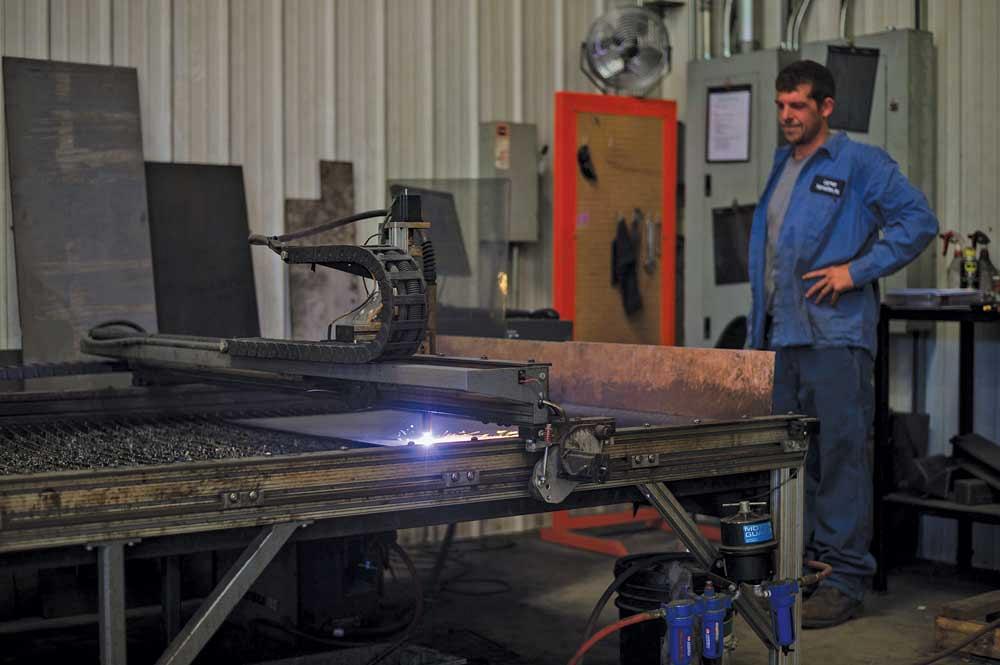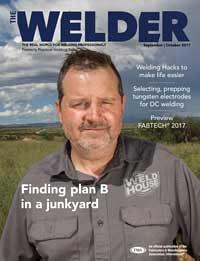- FMA
- The Fabricator
- FABTECH
- Canadian Metalworking
Categories
- Additive Manufacturing
- Aluminum Welding
- Arc Welding
- Assembly and Joining
- Automation and Robotics
- Bending and Forming
- Consumables
- Cutting and Weld Prep
- Electric Vehicles
- En Español
- Finishing
- Hydroforming
- Laser Cutting
- Laser Welding
- Machining
- Manufacturing Software
- Materials Handling
- Metals/Materials
- Oxyfuel Cutting
- Plasma Cutting
- Power Tools
- Punching and Other Holemaking
- Roll Forming
- Safety
- Sawing
- Shearing
- Shop Management
- Testing and Measuring
- Tube and Pipe Fabrication
- Tube and Pipe Production
- Waterjet Cutting
Industry Directory
Webcasts
Podcasts
FAB 40
Advertise
Subscribe
Account Login
Search
Help wanted: Character, not skill, in high demand
5 questions with Kyle Layman of Layman Fabrication Inc.
- By Amanda Carlson
- September 22, 2017
- Article
- Arc Welding
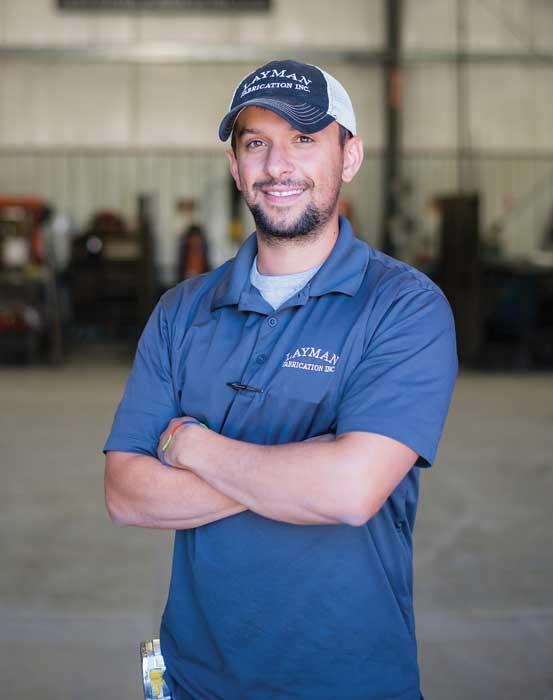
Kyle Layman isn’t interested in hiring individuals who just want a job; he wants to hire individuals who are looking for a career. But it hasn’t been easy.
Social media is a great way to connect with family and friends near and far; make professional connections; or stay up-to-date on the latest news, trends, and gossip. Sometimes, however, social media can serve as a platform to vent frustration and seek out advice.
Earlier this year Kyle Layman, a 26-year-old co-owner/general manager of Layman Fabrication Inc., a small job shop in North Vernon, Ind., was at his breaking point. His business was growing, and as a result, he had worked hard to create what he felt was a tightknit team environment with competitive pay and expanded benefits, all to entice skilled and motivated individuals. But what he found was that many of the applicants who came through the door lacked soft skills, a desire to learn, and professionalism.
Fed up, he wrote a post on LinkedIn that many small-business owners in the metal fabricating arena can relate to: Where are all the skilled, motivated, hard-working people? Layman discusses what led up to his post and how his company is dealing with this hot-button issue.
TW: What were the circumstances that led up to the LinkedIn post?
The hardest thing for me has been finding good, quality, skilled help. Actually, it’s not even so much the skills as it is finding people who possess the basic characteristics of a good employee. We were dealing with people who were OK with just not showing up to work. Oddly enough, those same people would ask for a pay raise. I was frustrated.
We are a company that hires people based on their character, and then we train them and develop their skills. It’s been difficult finding people of good character. What was also frustrating is that I think our pay scale here is good in comparison to other fields if you get on-the-job training, which we offer. When I wrote the LinkedIn post, I was frustrated because being a small shop makes it even harder to compete with the benefits package, pay, and attractiveness that larger companies have.
TW: Since character is revealed over time, how do you conduct a job interview to ensure that you are hiring people of quality character?
We’ll review their resume; call them in for an interview; and start asking questions about fabricating, welding, and who they are as a person. We want to know what their thoughts are on tardiness, their work history, if they want to be part of a team or if they just want to be doing their own thing. I want to know if these individuals are looking for a job or if they want a career. There’s a difference. Here, we work as a team, and I want everyone to connect well and get along with each other. That just makes the whole work experience so much better within the shop.
You can tell a lot about a person by how they dress, especially for a job interview. I’ve literally had someone walk in with a resume in hand wearing pajama pants. Needless to say, the interview was over before it began. I mean, if you can’t even put on a pair of pants for a job interview, I don’t want you working here. I want someone who is willing to put the effort in because I don’t want to waste my time. If you’re going to waste my time, then leave now because time is something I don’t have a lot of.
Honesty is also an important quality. I would much rather someone be totally honest with me about their abilities than try and act like they have it all together and are the best in the world. We hired a person once who said he knew how to do everything we did in-house and knew how to run every piece of equipment, so I gave him a shot. He only lasted four hours. He couldn’t turn a welder on much less run it. You can’t fake it just to collect a paycheck. You either know it or you don’t, and I’d rather you tell me upfront if you don’t know it so that I can teach you.
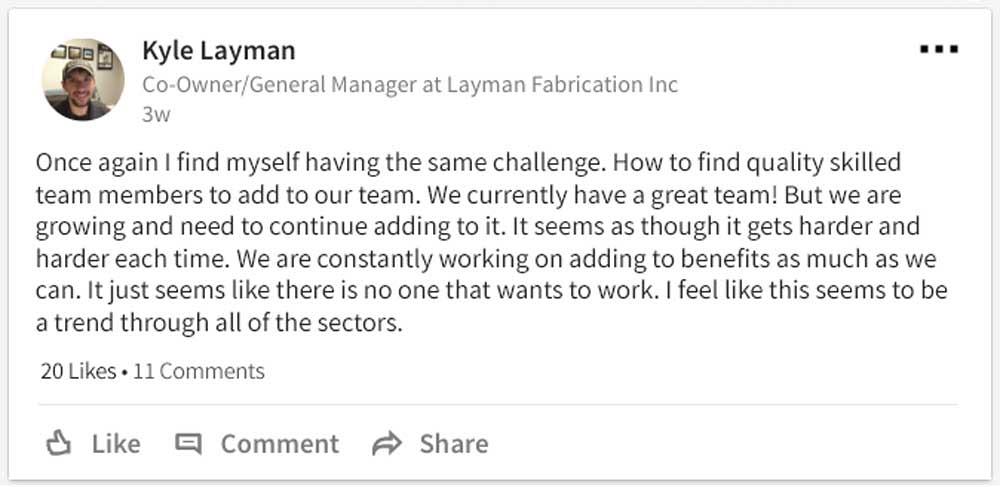
Layman’s LinkedIn post reflects his frustration and probably echoes the feelings of many small to medium-sized metal fabricators out there.
TW: How much does the stigma surrounding the millennial generation have to do with your struggles? Are millennial workers really as bad as people say, or is it a cop out for people who just don’t want to work very hard?
First off, anyone playing the millennial card is just using an excuse. The people who call us millennials are just giving people my age an excuse, and it’s horrible. To say the millennials are inherently lazy, well, I don’t buy it.
There are people with good and bad work ethics across all age groups. I see people who are in their 40s who have had 35 jobs in the last seven years. They’re not millennials. And then I’ll see 18-year-olds who come in and are motivated. I just don’t believe in the millennials thing. It’s crap.
Across the board, people of all ages can have a good work ethic. It just boils down to how he or she was raised and taught.
TW: Have you talked to other business owners dealing with the same issue?
Absolutely. I had people calling me in response to that LinkedIn post because they were dealing with the same problem and could totally relate. We deal with industrial and commercial industries only, and all of our customers are constantly hiring too. We have customers that are wanting to hire 200 to 300 people in the next few years and they are in a panic because they don’t know how they are going to find that many people.
I feel like employers who are looking for huge quantities of people might have it a little easier than us because you’re talking about production work. I’m not saying anyone can do it, but I think it’s a little easier because you can narrow your focus on what you actually need, like a MIG welder or a press brake operator or something like that.
What we need are people who are willing and able to wear many hats. We get guys that come in and say, “I’m a welder and I want to work here.” Well, I don’t need people who only weld. What I need are true fabricators, which is different than a welder. I want someone who can build a conveyor from a sketch. We need people who can think, quickly change and adapt, and who have an imagination.
TW: What, if anything, has changed at your company since your LinkedIn post?
I don’t remember exactly when I posted, but we have hired people. We’ve been in the new shop for three years, and at the time of the move, there were only three of us; now we’re up to 14. We’re having great growth and success now, but it’s not easy. I think the bigger you get as a shop, the easier it is to grow. Positive word-of-mouth means a lot, and it’s probably the best way to recruit quality talent. We now offer benefits like health insurance, and I feel as though we’ve improved our pay scale too. The growth we’ve experienced has allowed us to do those things.
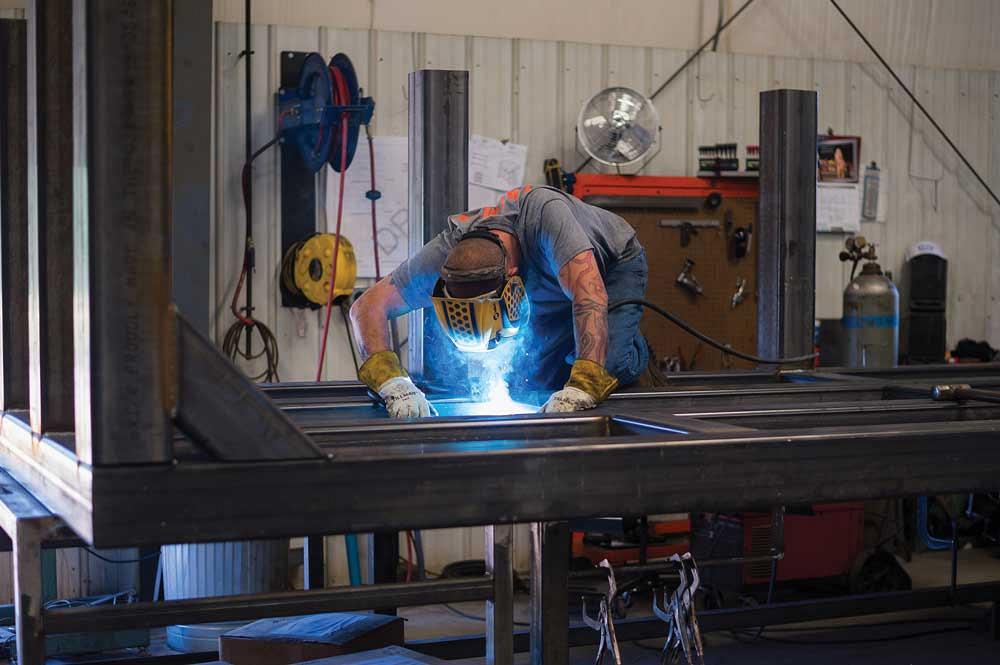
Competing with large companies is difficult, but Layman has worked very hard to create a salary and benefits package that he feels goes beyond what is offered at companies of similar size to his.
We really strive to be customer-oriented, but we also really want to be a good company to work for. Word travels fast, and we want the word about our company to be positive enough to attract good people who want to join our team. I think that’s happening. We’ve got people on staff who left their jobs just to be here, taking a pay cut in the process, because they know that they’ll love the job.
Layman Fabrication Inc., 812-767-2823, www.laymanfabricationinc.com
Photos courtesy of Danielle Jeffries Photography, North Vernon, Ind.
About the Author

Amanda Carlson
2135 Point Blvd
Elgin, IL 60123
815-227-8260
Amanda Carlson was named as the editor for The WELDER in January 2017. She is responsible for coordinating and writing or editing all of the magazine’s editorial content. Before joining The WELDER, Amanda was a news editor for two years, coordinating and editing all product and industry news items for several publications and thefabricator.com.
About the Publication
subscribe now
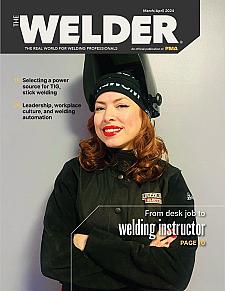
The Welder, formerly known as Practical Welding Today, is a showcase of the real people who make the products we use and work with every day. This magazine has served the welding community in North America well for more than 20 years.
start your free subscription- Stay connected from anywhere

Easily access valuable industry resources now with full access to the digital edition of The Fabricator.

Easily access valuable industry resources now with full access to the digital edition of The Welder.

Easily access valuable industry resources now with full access to the digital edition of The Tube and Pipe Journal.
- Podcasting
- Podcast:
- The Fabricator Podcast
- Published:
- 04/16/2024
- Running Time:
- 63:29
In this episode of The Fabricator Podcast, Caleb Chamberlain, co-founder and CEO of OSH Cut, discusses his company’s...
- Trending Articles
Sheffield Forgemasters makes global leap in welding technology
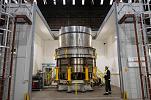
Welding student from Utah to represent the U.S. at WorldSkills 2024

Lincoln Electric announces executive appointments

Engine-driven welding machines include integrated air compressors

ESAB unveils Texas facility renovation

- Industry Events
16th Annual Safety Conference
- April 30 - May 1, 2024
- Elgin,
Pipe and Tube Conference
- May 21 - 22, 2024
- Omaha, NE
World-Class Roll Forming Workshop
- June 5 - 6, 2024
- Louisville, KY
Advanced Laser Application Workshop
- June 25 - 27, 2024
- Novi, MI
























